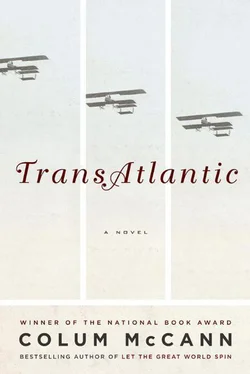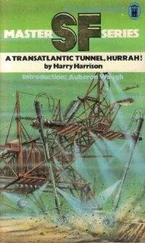The essence of intelligence was to know when, or if, to expose even the heart’s deep need for instruction.
If he showed a chink, they might shine a light through, stun him, maybe even blind him. He could not allow for a single mistake. It was not an excuse for arrogance. It was a matter of defense. Webb, of course, could not be expected to understand. How could he? He was an Irish Quaker. Good-hearted, yes. But he saw all his efforts as pure benevolence. It was not Webb’s freedom that was at stake. It was Webb’s ability to be free. Webb himself had his own ideas about who was slave, who was not, and what it was that lay between them.
Small matter, thought Douglass. He would not let it poison him. The Irish had been so friendly. He was a guest. He had to remember that.
The butler pushed the door open for him. Douglass entered the drawing room with his arms behind his back, his hands clasped. He felt it best to enter a room this way. Equal amounts of deference and aloofness in it. Not haughty. Never haughty. Just tall, full, solid.
It struck him: the sheer surprise of being here. A carpenter, a caulker of ships, a man of the fields. To have come such a distance. To have left behind his wife, his beloved children. To hear the sound of his shoes striking the floor. The only moving shoes in a roomful of men. His voice had now become his hands: he understood what it meant to be made flesh. An energy moved through him. He cleared his throat, but held back a moment. These were, he remembered, the members of the Royal Dublin Society. Creatures of high collars and groomed moustaches. They had an air of antiquity about them. He gazed out at them. The sort of men who had hung their swords above the fireplaces of their minds. He would wait to unleash his fury.
He stepped forward to shake their hands. Marked their names. Reverend Archibald. Brother Harrington. He would write them in his diary later tonight. These were the small matters of etiquette that he had to remember. The pronunciation. The spelling.
— It’s a pleasure to meet you, gentlemen.
— An honor, Mr. Douglass. We have read your book. A remarkable achievement.
— Thank you.
— There is much to learn from it. Much to admire in its style, even more in its content.
— You’re very kind.
— And is Dublin to your liking?
— It is livelier than Boston, yes.
There was laughter all around and he was grateful for it, the manner in which it allowed him to ease his body out of his stiffness. Webb guided him towards a deep chair in the center of the room. He glanced across to see Lily, the maid, pouring him a cup of tea. He liked his tea with an extraordinary amount of sugar. His weakness: a sweet tooth. Lily’s face, half carved in light as she poured, sharp, pretty, alabaster. She glided across to him. Her cool white wrists. The china cup was very thin. It was said that this made the tea taste better. He could feel the cup trembling in his hands. The thinner the china, the louder the rattle.
He hoped his manner of holding the teacup did not appear crude. He shifted slightly in his seat. He could feel his hands grow clammy again.
Webb introduced him. Even in America, Douglass had seldom listened to the introductions that others made. They embarrassed him. Sometimes they made of him a caricature: the colored conquistador, the gentleman slave, the American Orpheus. In the course of the introductions they would remark, invariably, that his father was a white man. As if it could not be otherwise. How he was taken from his mother, his siblings, whisked away, brought for a spell under the guidance of white benevolence. Douglass found the descriptions monotonous. The words dissolved in his head. He did not listen. He scanned the faces of the men. He could sense their uncertainty, a little hint of confusion around their eyes as he watched them, watching him. A slave. In a Dublin drawing room. So remarkably well-kept.
He looked up to see that Webb had finished. A silence. The teacup shook in his hands. He allowed the quiet to edge up against the uncomfortable. He had found that being nervous made him tighter with his words, stronger, more careful.
Douglass brought the saucer up to the bottom of the cup.
I prefer to be true to myself, even at the hazard of incurring the ridicule of others, rather than to be false, and incur my own abhorrence. From my earliest recollection I date the entertainment of a deep conviction that slavery would not always be able to hold me within its foul embrace. Now, in the long curve of this journey, I find myself spinning a new strand and I appeal to you, gentlemen, to strive against the despotism, bigotry and tyranny of those who might refuse me entry to this very room .
AT THE END of his second week he wrote to Anna that he hadn’t been called a nigger on Irish soil, not once, not yet anyway. He was hailed most everywhere he went. He wasn’t yet sure what to make of it, it baffled him. There was something crystallizing inside him. He felt, for the first time ever maybe, that he could properly inhabit his skin. There was a chance that he was just a curio to them, but something in him felt aligned to those he met, and in all his twenty-seven years he hadn’t seen anything like it. He wished she could be there to witness it.
It was a cold gray country under a hat of rain, but he could take the middle of the footpath, or board a stagecoach, or hail a hansom without apology. There was poverty everywhere, yes, but still he would take the poverty of a free man. No whips. No chains. No branding marks.
He was of course traveling in high company, but even on the roughest streets he had not heard any vitriol. He attracted a ferocious stare or two, but perhaps it was also because of the rather high cut at the back of his coat: Webb had already told him that he could perhaps afford a tad more modesty.
THE BELL ON the door sounded out long and lazy. The tailor looked up but the shop continued its business. That’s what surprised Douglass the most: the absence of alarm. No shock. No scurry. He walked along the rack of coats. The tailor finally came from behind the counter and shook his hand: You’re welcome to my establishment, sir.
— Thank you.
— You’re the talk of the town, sir.
— I’m interested in a new jacket.
— Certainly.
— And a longer cut of coat, said Webb.
— I’m quite capable of dressing myself, said Douglass.
They glared at each other across the gulf of the room.
— Gentlemen, said the tailor. Come this way.
Webb stepped across but Douglass put his hand on his chest. The air froze. Webb lowered his eyes and gave the faint hint of a smile. He took out a wallet of morocco leather and rubbed the length of it, inserted it back in his jacket pocket.
— As you wish.
Douglass stepped, large and loud-footed, with the tailor towards a rear room. Scissors, needles, cutouts. Dusty ells and bolts of cloth spooled out across the tables. What fields did the cloth come from? What fingers had spun it out?
The tailor whisked a looking glass across the room. The mirror was on a stand, mounted with wheels.
He had never been measured by a white man before. The tailor stood behind him. Douglass flinched a moment when the tape was put around his neck.
— Sorry, sir, is the tape cold?
He closed his eyes. Allowed the measurements. His rib cage, his chest, his waist. Raised his arms in the air to see how deep the armpit of the waistcoat could go. Breathed in, breathed out. Allowed the tattered yellow tape along his inseam. The tailor scribbled the measurements down. His handwriting was fine and exact.
When he was finished, the tailor wrapped his fingers around Douglass’s shoulders, gripped him hard.
— You’re a fine broad man, sir, I’ll venture that.
Читать дальше












